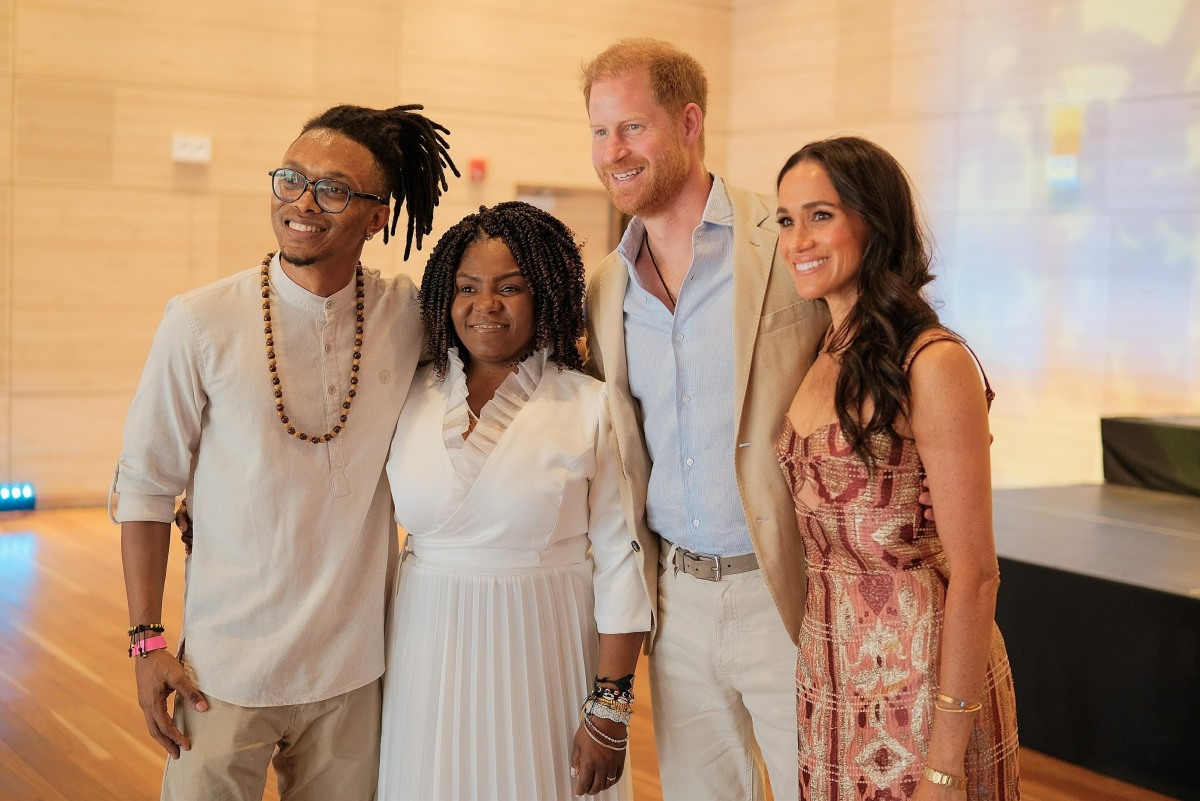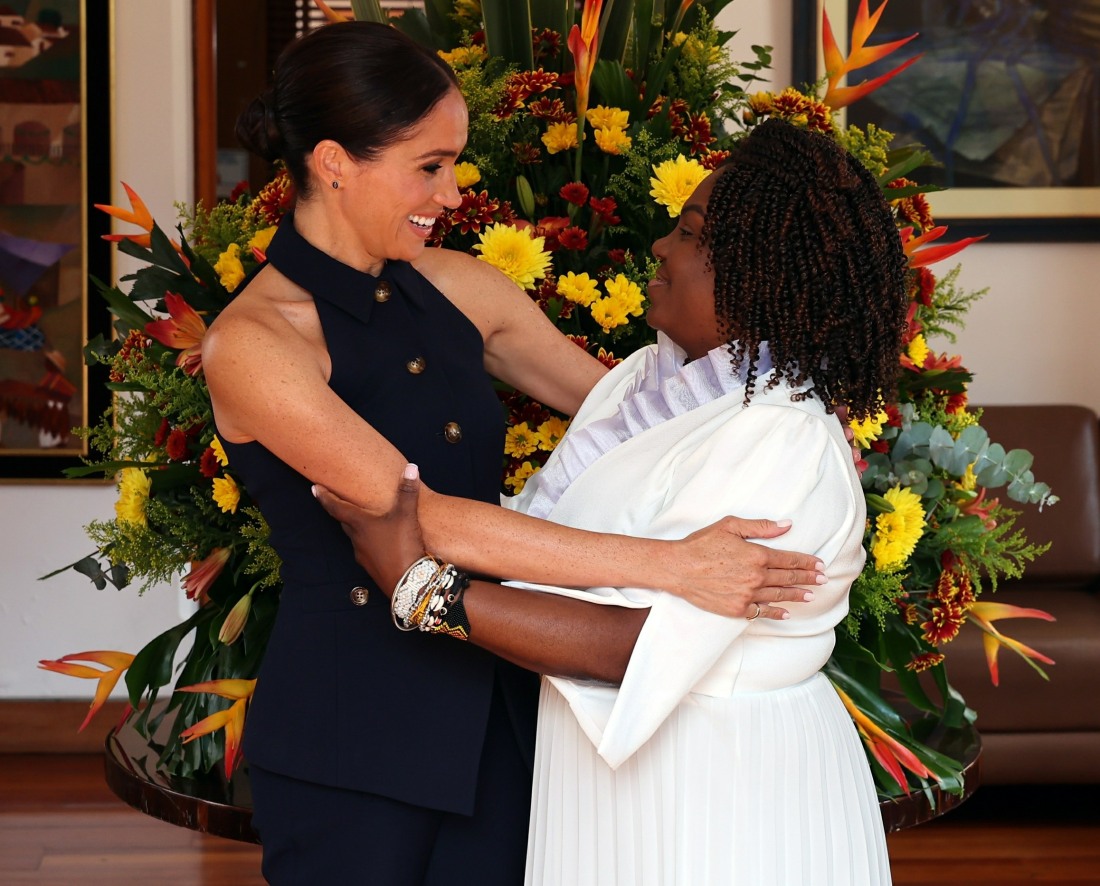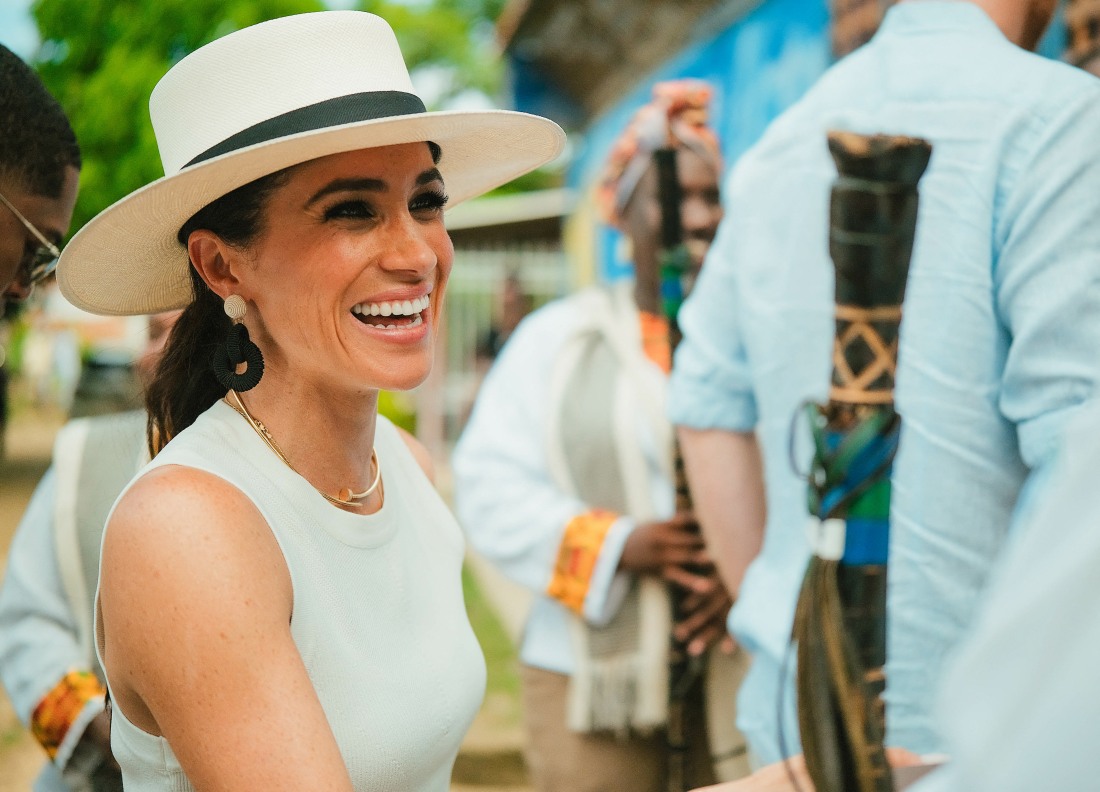ARTICLE AD
The British media’s coverage of the Sussexes’ Colombian tour was hilariously wacky. The salty British media could not pick a lane – in one article, they would blast the Sussexes for not getting enough attention in Colombia, and in the next article, they would blast the Sussexes for not using their enormous power and influence to speak on every single issue. Speaking of, let’s talk about colonialism. Spain and Portugal colonized much of South America, which is why Spanish and Portuguese is still spoken throughout most South American countries. Colombia was colonized by Spain, and the Spanish slave trade thrived in Colombia, which is why there are so many Colombians of African descent today. Colombians threw off their Spanish shackles in the 19th century. Notice that I did not mention the British empire or British colonialism whatsoever. And yet… the Telegraph ran a piece in which “people” demanded that Harry and Meghan “apologize for colonialism.”
When the Duke of Sussex steps into San Basilio de Palenque on Saturday, he will do so as both the son of a King and a man who left the British monarchy behind. He has decried the “unjust” system that saw “enslaved people” generate wealth for the crown, but around the world remains seen as a member of the Royal family.
The visit to a town founded by escaped slaves in the colonial era and now a symbol of their resistance is, in other words, complicated. The tourist destination is set to be a highlight of the Duke and Duchess of Sussexes’ trip to Colombia, which has seen them hosted by a passionately anti-colonial vice-president who is leading calls for slavery reparations. For some, inevitably, it raises questions.
Will the couple use their day of learning about Afro-Colombian revolutionary history to touch on the obvious topics of slavery, colonialism, and Britain’s former role in it? Will the Duchess speak of her own family history, as she did in their last visit to Nigeria? And will Prince Harry fulfil the dreams of campaigners by outrightly condemning or apologising for the role of royals centuries ago? The visit, campaigners say, is the ideal chance for the Duke and Duchess of Sussex to venture further than they ever have before in decrying the evils of the colonial slave trade, whether part of the Spanish Empire as it was in Colombia or the British elsewhere. They are, it is thought by some, “uniquely positioned” to move the conversation about reparations forward.
Laura Trevelyan, whose own family has made an apology and reparations for its historic role in the slave trade, said: “Because they’re not working royals, they have a bit of cover, but they are still hugely influential.
“Even by meeting Colombia’s vice-president, Harry and Meghan are signalling that they’re prepared to hear more about the debate over how to repair the lasting legacies of slavery. I hope they use their influential position to move the discussion forward.”
Arley Gill, chairman of Grenada’s National Reparations Commission, urged Prince Harry to use the opportunity to apologise and support “reparative justice”. “If he does that, he will be on the right side of history,” he said. “It would mean a whole lot.” After all, he joked, he was already “ostracised” from the Royal family and “can’t leave twice!”.
Any intervention by the Sussexes would be viewed as deeply provocative by their critics, adding to the pressure the UK Government and the palace is already facing from reparations campaigners.
Again, Harry and Meghan escaped the British royal family, not the Spanish royal family. While I would love to hear King Felipe and Queen Letizia speak on Spain’s colonialist history in South America, that was not the point of the Sussexes’ tour. Instead, it was something altogether different. Once we saw the Sussexes’ events in Colombia and saw the way VP Francia Marquez had arranged the trip, it became clear to me why Marquez wanted the Sussexes to come. Marquez is highlighting global Blackness, and she used Meghan’s presence, as a Black American woman, to show the connections for people of African descent. The visit was not about Harry’s connection to a colonialist family, it was about Meghan and using her race and her experiences to speak to the Black Colombian community.
Photos courtesy of Backgrid, Cover Images.
 Bogota, COLOMBIA – Prince Harry, Duke of Sussex, Meghan Markle, Duchess of Sussex, during a meeting with Vice President Francia Marquez and her partner Rafael Yerney Pinillo in Bogota, on the first day of their 4 day visit to Colombia – Poolphoto by Courtesy of the Vice President’s Office for DPPA.
Pictured: Prince Harry, Meghan Markle, Francia Márquez
BACKGRID USA 15 AUGUST 2024
USA: +1 310 798 9111 / usasales@backgrid.com
UK: +44 208 344 2007 / uksales@backgrid.com
*UK Clients – Pictures Containing Children
Please Pixelate Face Prior To Publication*
Bogota, COLOMBIA – Prince Harry, Duke of Sussex, Meghan Markle, Duchess of Sussex, during a meeting with Vice President Francia Marquez and her partner Rafael Yerney Pinillo in Bogota, on the first day of their 4 day visit to Colombia – Poolphoto by Courtesy of the Vice President’s Office for DPPA.
Pictured: Prince Harry, Meghan Markle, Francia Márquez
BACKGRID USA 15 AUGUST 2024
USA: +1 310 798 9111 / usasales@backgrid.com
UK: +44 208 344 2007 / uksales@backgrid.com
*UK Clients – Pictures Containing Children
Please Pixelate Face Prior To Publication*
 Bogota, COLOMBIA – Prince Harry, Duke of Sussex, Meghan Markle, Duchess of Sussex, during a meeting with Vice President Francia Marquez and her partner Rafael Yerney Pinillo in Bogota, on the first day of their 4 day visit to Colombia – Poolphoto by Courtesy of the Vice President’s Office for DPPA.
Pictured: Prince Harry, Meghan Markle, Francia Márquez
BACKGRID USA 15 AUGUST 2024
USA: +1 310 798 9111 / usasales@backgrid.com
UK: +44 208 344 2007 / uksales@backgrid.com
*UK Clients – Pictures Containing Children
Please Pixelate Face Prior To Publication*
Bogota, COLOMBIA – Prince Harry, Duke of Sussex, Meghan Markle, Duchess of Sussex, during a meeting with Vice President Francia Marquez and her partner Rafael Yerney Pinillo in Bogota, on the first day of their 4 day visit to Colombia – Poolphoto by Courtesy of the Vice President’s Office for DPPA.
Pictured: Prince Harry, Meghan Markle, Francia Márquez
BACKGRID USA 15 AUGUST 2024
USA: +1 310 798 9111 / usasales@backgrid.com
UK: +44 208 344 2007 / uksales@backgrid.com
*UK Clients – Pictures Containing Children
Please Pixelate Face Prior To Publication*
 Bogota, COLOMBIA – Prince Harry, Duke of Sussex, Meghan Markle, Duchess of Sussex, during a meeting with Vice President Francia Marquez and her partner Rafael Yerney Pinillo in Bogota, on the first day of their 4 day visit to Colombia – Poolphoto by Courtesy of the Vice President’s Office for DPPA.

Pictured: Prince Harry, Meghan Markle, Francia Márquez

BACKGRID USA 15 AUGUST 2024 

USA: +1 310 798 9111 / usasales@backgrid.com

UK: +44 208 344 2007 / uksales@backgrid.com

*UK Clients – Pictures Containing Children
Please Pixelate Face Prior To Publication*
Bogota, COLOMBIA – Prince Harry, Duke of Sussex, Meghan Markle, Duchess of Sussex, during a meeting with Vice President Francia Marquez and her partner Rafael Yerney Pinillo in Bogota, on the first day of their 4 day visit to Colombia – Poolphoto by Courtesy of the Vice President’s Office for DPPA.

Pictured: Prince Harry, Meghan Markle, Francia Márquez

BACKGRID USA 15 AUGUST 2024 

USA: +1 310 798 9111 / usasales@backgrid.com

UK: +44 208 344 2007 / uksales@backgrid.com

*UK Clients – Pictures Containing Children
Please Pixelate Face Prior To Publication*
 Bogota, COLOMBIA – Prince Harry, Duke of Sussex, Meghan Markle, Duchess of Sussex, during a meeting with Vice President Francia Marquez and her partner Rafael Yerney Pinillo in Bogota, on the first day of their 4 day visit to Colombia – Poolphoto by Courtesy of the Vice President’s Office for DPPA.
Pictured: Meghan Markle, Francia Márquez
BACKGRID USA 15 AUGUST 2024
USA: +1 310 798 9111 / usasales@backgrid.com
UK: +44 208 344 2007 / uksales@backgrid.com
*UK Clients – Pictures Containing Children
Please Pixelate Face Prior To Publication*
Bogota, COLOMBIA – Prince Harry, Duke of Sussex, Meghan Markle, Duchess of Sussex, during a meeting with Vice President Francia Marquez and her partner Rafael Yerney Pinillo in Bogota, on the first day of their 4 day visit to Colombia – Poolphoto by Courtesy of the Vice President’s Office for DPPA.
Pictured: Meghan Markle, Francia Márquez
BACKGRID USA 15 AUGUST 2024
USA: +1 310 798 9111 / usasales@backgrid.com
UK: +44 208 344 2007 / uksales@backgrid.com
*UK Clients – Pictures Containing Children
Please Pixelate Face Prior To Publication*
 Bogota, COLOMBIA – Prince Harry, Duke of Sussex, Meghan Markle, Duchess of Sussex, during a meeting with Vice President Francia Marquez and her partner Rafael Yerney Pinillo in Bogota, on the first day of their 4 day visit to Colombia – Poolphoto by Courtesy of the Vice President’s Office for DPPA.

Pictured: Prince Harry, Meghan Markle, Francia Márquez

BACKGRID USA 15 AUGUST 2024 

USA: +1 310 798 9111 / usasales@backgrid.com

UK: +44 208 344 2007 / uksales@backgrid.com

*UK Clients – Pictures Containing Children
Please Pixelate Face Prior To Publication*
Bogota, COLOMBIA – Prince Harry, Duke of Sussex, Meghan Markle, Duchess of Sussex, during a meeting with Vice President Francia Marquez and her partner Rafael Yerney Pinillo in Bogota, on the first day of their 4 day visit to Colombia – Poolphoto by Courtesy of the Vice President’s Office for DPPA.

Pictured: Prince Harry, Meghan Markle, Francia Márquez

BACKGRID USA 15 AUGUST 2024 

USA: +1 310 798 9111 / usasales@backgrid.com

UK: +44 208 344 2007 / uksales@backgrid.com

*UK Clients – Pictures Containing Children
Please Pixelate Face Prior To Publication*
 Handout photos of Prince Harry, Meghan Markle during their official visit to the school of drums of the cabildo in Cartagena.
Featuring: Prince Harry, Meghan Markle
Where: Cartagena, Colombia
When: 17 Aug 2024
Credit: Prince Harry, Duke of Sussex, Meghan, Duchess of SussexAbaca Press/INSTARimages
**NORTH AMERICA RIGHTS ONLY**
Handout photos of Prince Harry, Meghan Markle during their official visit to the school of drums of the cabildo in Cartagena.
Featuring: Prince Harry, Meghan Markle
Where: Cartagena, Colombia
When: 17 Aug 2024
Credit: Prince Harry, Duke of Sussex, Meghan, Duchess of SussexAbaca Press/INSTARimages
**NORTH AMERICA RIGHTS ONLY**
 Handout photos of Prince Harry, Meghan Markle during their official visit to the school of drums of the cabildo in Cartagena.
Featuring: Prince Harry, Meghan Markle
Where: Cartagena, Colombia
When: 17 Aug 2024
Credit: Prince Harry, Duke of Sussex, Meghan, Duchess of SussexAbaca Press/INSTARimages
**NORTH AMERICA RIGHTS ONLY**
Handout photos of Prince Harry, Meghan Markle during their official visit to the school of drums of the cabildo in Cartagena.
Featuring: Prince Harry, Meghan Markle
Where: Cartagena, Colombia
When: 17 Aug 2024
Credit: Prince Harry, Duke of Sussex, Meghan, Duchess of SussexAbaca Press/INSTARimages
**NORTH AMERICA RIGHTS ONLY**
 Handout photos of Prince Harry, Meghan Markle during their official visit to the school of drums of the cabildo in Cartagena.
Featuring: Prince Harry, Meghan Markle
Where: Cartagena, Colombia
When: 17 Aug 2024
Credit: Prince Harry, Duke of Sussex, Meghan, Duchess of SussexAbaca Press/INSTARimages
**NORTH AMERICA RIGHTS ONLY**
Handout photos of Prince Harry, Meghan Markle during their official visit to the school of drums of the cabildo in Cartagena.
Featuring: Prince Harry, Meghan Markle
Where: Cartagena, Colombia
When: 17 Aug 2024
Credit: Prince Harry, Duke of Sussex, Meghan, Duchess of SussexAbaca Press/INSTARimages
**NORTH AMERICA RIGHTS ONLY**
 Handout photos of Prince Harry, Meghan Markle during their official visit to the school of drums of the cabildo in Cartagena.
Featuring: Prince Harry, Meghan Markle
Where: Cartagena, Colombia
When: 17 Aug 2024
Credit: Prince Harry, Duke of Sussex, Meghan, Duchess of SussexAbaca Press/INSTARimages
**NORTH AMERICA RIGHTS ONLY**
Handout photos of Prince Harry, Meghan Markle during their official visit to the school of drums of the cabildo in Cartagena.
Featuring: Prince Harry, Meghan Markle
Where: Cartagena, Colombia
When: 17 Aug 2024
Credit: Prince Harry, Duke of Sussex, Meghan, Duchess of SussexAbaca Press/INSTARimages
**NORTH AMERICA RIGHTS ONLY**
 Handout photos of Prince Harry, Meghan Markle pose for a photo during their official visit to Bogota,
Featuring: Prince Harry, Meghan Markle
Where: Bogota, Colombia
When: 16 Aug 2024
Credit: Prince Harry, Duke of Sussex, Meghan, Duchess of SussexAbaca Press/INSTARimages
**NORTH AMERICA RIGHTS ONLY**
Handout photos of Prince Harry, Meghan Markle pose for a photo during their official visit to Bogota,
Featuring: Prince Harry, Meghan Markle
Where: Bogota, Colombia
When: 16 Aug 2024
Credit: Prince Harry, Duke of Sussex, Meghan, Duchess of SussexAbaca Press/INSTARimages
**NORTH AMERICA RIGHTS ONLY**
 Handout photos of Prince Harry, Meghan Markle during their official visit to the school of drums of the cabildo in Cartagena.
Featuring: Prince Harry, Meghan Markle
Where: Cartagena, Colombia
When: 17 Aug 2024
Credit: Prince Harry, Duke of Sussex, Meghan, Duchess of SussexAbaca Press/INSTARimages
**NORTH AMERICA RIGHTS ONLY**
Handout photos of Prince Harry, Meghan Markle during their official visit to the school of drums of the cabildo in Cartagena.
Featuring: Prince Harry, Meghan Markle
Where: Cartagena, Colombia
When: 17 Aug 2024
Credit: Prince Harry, Duke of Sussex, Meghan, Duchess of SussexAbaca Press/INSTARimages
**NORTH AMERICA RIGHTS ONLY**
 Prince Harry, Duke of Sussex, Meghan, Duchess of Sussex, Colombian Vice President Francia Marquez and her husband Yerney Pinillo, Colombia, Valle del Cauca’s Governor Dilian Francisca Toro during the closing event of the Afro Women and Power forum in Cali, Colombia
Featuring: Prince Harry, Duke of Sussex, Meghan, Duchess of Sussex, Colombian Vice President Francia Marquez, Yerney Pinillo, Valle del Cauca’s Governor Dilian Francisca Toro
Where: Cali, Valle del Cauca, Colombia
When: 19 Aug 2024
Credit: Abaca Press/INSTARimages
**NORTH AMERICA RIGHTS ONLY**
Prince Harry, Duke of Sussex, Meghan, Duchess of Sussex, Colombian Vice President Francia Marquez and her husband Yerney Pinillo, Colombia, Valle del Cauca’s Governor Dilian Francisca Toro during the closing event of the Afro Women and Power forum in Cali, Colombia
Featuring: Prince Harry, Duke of Sussex, Meghan, Duchess of Sussex, Colombian Vice President Francia Marquez, Yerney Pinillo, Valle del Cauca’s Governor Dilian Francisca Toro
Where: Cali, Valle del Cauca, Colombia
When: 19 Aug 2024
Credit: Abaca Press/INSTARimages
**NORTH AMERICA RIGHTS ONLY**

 1 month ago
12
1 month ago
12 




